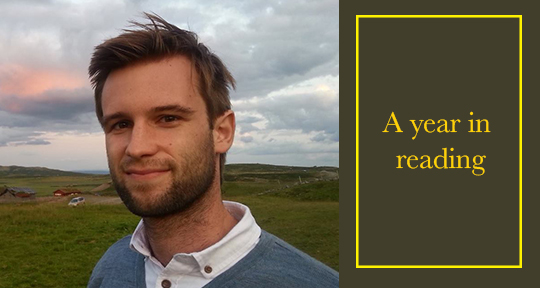Assistant Managing Editor Jacob Silkstone travelled between several countries and two distinct stages of his life in 2017—and still had time to read a ton of literature! Today, in our final column, he reflects on the books that accompanied him on the move.
* * *
“If I imagine something, I see it. What more would I do if I travelled? Only extreme feebleness of the imagination can justify anyone needing to travel in order to feel.”
The complete edition of Fernando Pessoa’s The Book of Disquiet (translated by the incomparable Margaret Jull Costa) finally became available to English readers in 2017, and I first read Bernardo Soares’ hodophobic lines in an Airbnb flat in Portugal at the 40-degree height of summer. The water supply had been temporarily cut off and for hours the taps dribbled a thin brown fluid, but I had Soares’ life “of slow rain in which everything is … half-shadow” to keep me occupied.
In a year that began with the Trump travel ban and continued to be marred by small, scared attempts to shelter from the world behind various walls (both real and imaginary), it seems worth playing Devil’s advocate to Soares/Pessoa: perhaps there can be some justification for travelling “in order to feel.”
This year, I moved between several countries and two distinct stages of my life—having finally proposed after nearly nine years in a relationship, I got married in July. The evening after the wedding, I gave my copy of The Ministry of Utmost Happiness away on a whim to one of our guests, a foreign correspondent working in the Middle East. That copy subsequently embarked on a journey Arundhati Roy would have been proud of, travelling from Beirut to Syria to Yemen. When my friend was smuggled out of Al Qaeda-controlled territory (a 26-hour drive), The Ministry of Utmost Happiness was the one novel she had with her. It seems churlish to add at this point that the novel was something of a disappointment: Arundhati Roy is a fantastic storyteller and a staggeringly courageous journalist, but isn’t quite able to perform both roles simultaneously. The Ministry of Utmost Happiness came across as a book with its heart always in absolutely the right place, but its editor too frequently in the wrong one.
Viet Thanh Nguyen’s new collection of short stories, The Refugees, accompanied me on the first leg of my honeymoon, from Oslo to Dubai. Many of Nguyen’s characters are forced to exist on the margins of American society, and the narrator of the opening story describes fiction itself as a collection of “garments shed by ghosts.” Recovering the stories is the closest we can come to recovering the ghosts, although every ghost may be irretrievably lost.
From Dubai, another flight took me on to Mauritius. In Port Louis’ only English-language bookshop, I picked up C. Dickson’s translation of Le Clézio’s The Prospector. Alexis, the novel’s protagonist, is a traveller in search of (a) lost time, moving through first the Indian Ocean and then the killing fields of the Somme towards “the other side of the world… a place where neither the signs in the sky nor the wars men wage are feared any longer.” To tell Alexis’ story, Le Clézio’s style has been honed down to something approaching the simplicity of fable.
On my last evening in Mauritius, I walked out to the end of a pier holding the one book that had been with me on every journey I’d made since the start of summer. Ulrich, Robert Musil’s titular Man Without Qualities (indefatigably translated by Sophie Wilkins), has given up travelling altogether and settled in ‘Kakania’ (a very thinly-disguised version of Vienna) “with the feeling of a hiker who sits down on a bench for eternity, but with the thought that he will be getting up again immediately.”
Musil described his unfinished novel as “a bridge into space”. It has no ending, but no book can be prolonged indefinitely… I read the final page with my feet in the ocean, then watched a yellow-and-white tropical fish nibbling at a discarded hunk of bread from the hotel buffet and drifting south with the tide toward the waiting nets in the next village. Perhaps the fitting thing to do would have been to throw the book into the water and let the waves close over it, but I carried it with me when I turned and walked back along the pier to the beach and the walkway lined with coconut palms.
Writing this in Norway with the snow falling outside my window, almost as though the streetlamps were shedding skin, it seems impossible that I’ll ever have the privilege of returning to either the places or the books which defined 2017 for me. Perhaps, paraphrasing Heraclitus (already paraphrased by Plato), returning really is impossible: everything changes and nothing remains still, and you can’t truly read the same book twice. Every journey ends with a door shutting, a cover gently closed.
Read more reflections by staff:

